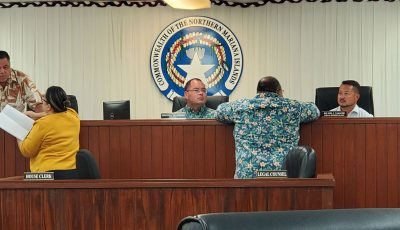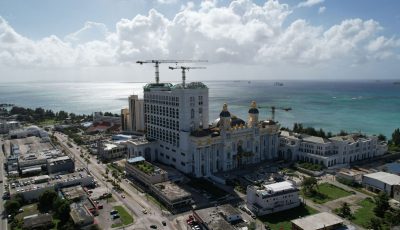House overrides Torres’ veto of feasibility study on casino gaming
House fails to override governor’s veto on 2 other provisions in budget bill
The House of Representatives overrode Friday Gov. Ralph DLG Torres’ veto of a provision in the budget bill that would require the conduct of a feasibility study on casino gaming, but failed to muster enough votes to override a veto that would prohibit taxpayers from footing the utility bills of the governor, lieutenant governor, and legislative officers at their personal residences.
The House also failed to override the governor’s veto on a provision in the budget bill that deals with the American Rescue Plan Act spending plan.
It was House Ways and Means Committee chair Rep. Donald M. Manglona (Ind-Rota) who made the three motions to override. To pass the override the vetoes, the House needed 14 “yes” votes, according to House Speaker Edmund S. Villagomez (Ind-Saipan). The House is composed of 20 representatives. Rep. Christina E. Sablan (D-Saipan) was absent but was excused from the session last Friday.
With 15 voting “yes,” three voting “no,” and two absences, the House overrode Torres’ veto on Section 704(c), a provision in the budget bill that requires the Office of Planning and Development to conduct a feasibility study on the casino gaming industry in the Commonwealth using $50,000 of its own budget.
Rep. Roy Ada (R-Saipan), who attended the session via conference call, did not reply during voting and was considered absent in this motion.
Those who voted “no” were Reps. Angel A. Demapan (R-Saipan), Patrick San Nicolas (R-Tinian), and Joseph Lee Pan Guerrero (R-Saipan).
In order for an override to be effective, the Senate also has to entertain a motion of its own for the same section that the House successfully voted to override.
With 11 voting “yes,” eight voting “no”, and one absence, the House failed to pass the motion to override the governor’s line-item veto on Section 601, a provision in the budget bill that appropriates funds for the payment of utilities for the Legislative and Judicial branches, while the payment of utilities for the Executive Branch is allocated under the American Rescue Plan Act under government utilities.
The eight who voted “no” were all minority bloc members—Vice Speaker Blas Jonathan Attao, and Reps. Roy Ada, Joel Camacho, Angel Demapan, Joseph Flores, Joseph Lee Pan Guerrero, Patrick San Nicolas, and John Paul Sablan. All are Republicans, except Flores, who is an Independent.
With 11 “yes” votes, eight “no” votes, and one absent, the House failed to pass the motion to override Torres’ veto on Section 802(d), a provision that mandates that no changes be made to the allocations of outside sourced funds in the ARPA spending plan without legislative consent in the form of a House joint resolution.
The eight who voted “no” were minority bloc members—Attao, Ada, Rep. Joel Camacho, Demapan, Flores, Guerrero, John Paul Sablan, and San Nicolas.
Floor leader Ralph N. Yumul (R-Saipan) voted “yes” to all three motions.
In a later press statement, Demapan said the minority bloc supports reasonable cap for utilities for official residences. Demapan said the House minority elected to forego an override on the line-item veto of Section 601 and instead will work on legislation to clarify the provision of official residences for eligible elected officials as well as the implementation of a reasonable cap on the amount of utility charges allowed per month.
Demapan said the minority bloc acknowledges that the law is currently too vague and needs to be amended to add safeguards. “In particular, the minority [bloc] would like to explore provisions clarifying the use of private residences in the absence of functional government dwelling units, and the implementation of reasonable caps on allowable utility charges,” he said.
At the start of the session, Manglona said the House has 60 days from the receipt of the governor’s veto message to reconsider the vetoed provisions in the legislation. That places the deadline at Nov. 30, he said.
He said the Ways and Means Committee identified three line-item vetoes that they would like to override.
One was Torres veto of Section 601, which prohibits the payment of utilities of personal residences of the governor and the lieutenant governor and presiding officers of the Legislature.
Manglona said the House Judiciary and Governmental Operations Committee hearings that is investigating Torres’ expenditures and travels has uncovered utility records that indicate excessive use of water and power. He said while the governor and lieutenant governor are entitled to government housing, paying the utilities of their personal residences in lieu of providing them housing, still goes against the statute.
“And just because past administrations have done it doesn’t mean we shall continue this trend,” Manglona said.
Rep. Leila Staffler (D-Saipan) pointed out that the law does not say anywhere that the utility bills shall be paid in lieu of the government housing not being available.
Staffler said the Department of Finance’s practice of authorizing utility payments for not just one but several residences of the governor alone is not authorized by law and should cease immediately.
“That is one of the main reasons that we propose to override that veto,” Staffler said.
Rep. Corina L. Magofna (D-Saipan) said just because it was done that way in the past it doesn’t necessarily mean that it’s the right thing. “As our law states, there’s actually nothing in there that says that that practice is allowed,” Magofna said.
She said they’d have to find a better way to go about it and that’s what they would like to give the governor and other officials.
On Torres’ line-item veto on Section 704(c ), Manglona said that, while the governor states that this should be left to the Commonwealth Casino Commission, they feel that the CCC may not have the capacity to conduct a study and therefore OPD is best suited for this study.
Rep. Edwin K. Propst (D-Saipan), who chairs the House Gaming Committee, said that such a study is within OPD’s powers and that they need an independent, professional and impartial study of the market feasibility and regulatory structure for the gaming industry for the CNMI.
He said the gaming industry in the CNMI started off wrong from the very beginning, including the way the second casino act was written, the selection of Imperial Pacific International (CNMI) LLC without due diligence, the changing terms of the license agreement, and the lack enforcement of the CNMI laws.
“We have an opportunity right now to learn from history,” he said.
This study, Propst said, is a critical first step in the right direction and that OPD is the most appropriate agency to contract with a qualified firm to conduct a study.
He said OPD is in the process of finalizing a comprehensive economic development plan for the Commonwealth and that plan currently is silent on the future of the CNMI gaming industry.
“They agree that a consideration of the future of gaming should be part of this planning process,” he said.
Propst noted that Marianas Visitors Authority’s own 10-year tourism recovery strategy also says absolutely zero about the future of gaming in the tourism plan.
He said OPD is already mandated by law to conduct such research and development studies to help guide the CNMI’s planning process and to assist policy makers in the decision making.
Propst pointed out that the Commonwealth Casino Commission is also currently already entangled with IPI in the legal battle over the suspension and revocation of the casino license, lack of staff, and may have a conflict in terms of its ability to be fair and impartial.
Rep. Sheila J. Babauta (D-Saipan) said $50,000 to conduct a study is a small amount to find information that would be helpful to the community and decision makers.
The third line-utem veto refers to Section 802 (d), which is the ARPA expenditure. Manglona said this particular provision, which both Senate and House agree on, requires the joint legislative approval for any actions that will be taken on Volume Four of ARPA.
He said Torres only pointed out one concern in his veto message—that it would delay efficient processes already in place. Manglona said Torres goes on to mention that the spending plan was approved by U.S. Treasury and that they have already made significant changes between the April and July submission.
“This is all of the more reason to ensure that the spending plan of the U.S Treasury is being followed and that these changes, which we agreed upon by adopting the governor’s Volume Four proposal is being followed and does not deviate from that spending plan and that the allocations we have made in the general fund, which rely heavily on the funds, the departments and agencies will be receiving through ARPA,” he said.
Rep. Celina Babauta (D-Saipan) said this provision simply protects government agencies in carrying out their priorities to improve their departments and their services to the public.
Babauta said the argument to support this override is that Torres continually renews the reprogramming authority of the Finance secretary.
“This administrative provision protects the departments from that,” she said.
Attao said he does understand the intent of the override and that he respects that. “But one of the things that we need to understand first is are we trying to co-mingle the general fund with the ARPA funds? I understand that the ARPA spending plan was utilized in coming up with a budget that will be proposed to the body for adoption and we did that,” Attao said.



























